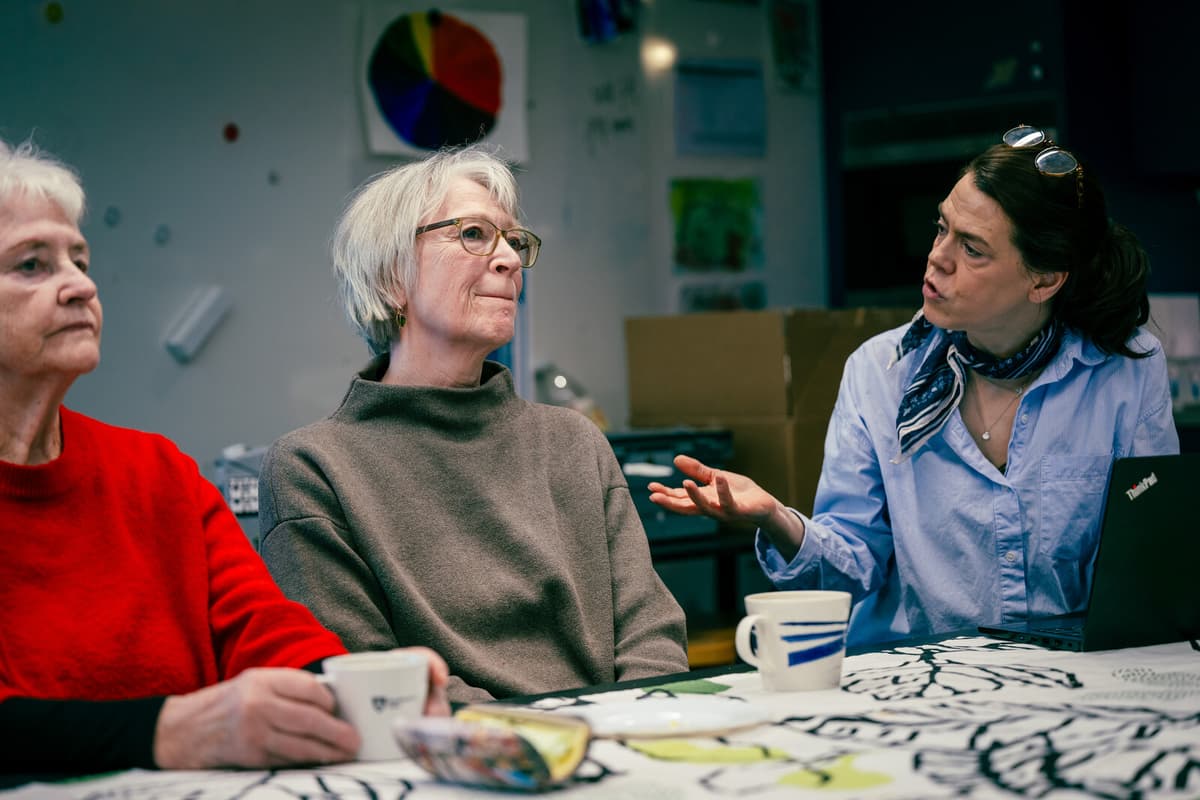Are our brains most sharp at 30 and then change? Or can we keep our brains alert and delay deterioration?
Around the table at the Tranströmer Library in central Stockholm, there is agreement. Reading and discussions keep the brains in trim.
I read in a different way when I know I'm going to discuss the book, I need to reflect and explain why I think and feel certain things. The thought is kept active, says Christina Weström.
Here, in one of Stockholm's city libraries, she and the others in the book circle meet once a month and discuss literature under the leadership of librarians Sara Dahlin and Therese Flodqvist. Today, it's "Submission" by Michel Houellebecq that's being discussed. Opinions are divided.
I wanted to throw it away at first, I got so angry. But I continued because I knew I would talk about it here, says Inger Henricsson.
Daphne Hofsö, the oldest in the circle at 97, says the book made her think and gave her new perspectives.
I've been reading my whole life and many classics, but I've broadened my taste since I joined the book circle. I hadn't read Knausgaard before, for example, but now I've read almost everything by him.
Like solving a puzzle
The discussion is lively. Descriptive sex scenes, Islamophobia, and whether it's okay to appreciate an author who seems to be a "real bastard" are being discussed.
Coffee and biscuits are being served.
We've read the same book but have different experiences and experiences. It's like we're solving a puzzle together, says librarian Sara Dahlin.
And the ladies, all over 65, are not wrong when they mean that reading contributes to keeping them going. In a new study, researchers point out that the brain's deteriorated cognition is not just a part of natural aging, which has long been the prevailing view.
The conclusion of the study, published in the journal Science Advances, is that if the brain is kept active, the decline of cognitive functions can be delayed. Cognition inevitably gets worse with age, but it seems to be able to be maintained for a longer period if you activate it through, for example, reading or solving math problems.
The study is interesting because it looked at the same individuals at different times and didn't just compare different age groups with each other, says Erika Jonsson Laukka, who researches cognitive health and aging at the Karolinska Institute.
Solving math problems
Previous research has shown that each generation performs better on cognitive tests than previous ones. This has been linked to the fact that educational levels have steadily increased over the years.
In the new study, it was also seen that those with more intellectually demanding jobs maintained their cognitive abilities longer than those with less qualified work. But even those who read and did math in their free time seemed to be able to slow down the decline of these abilities.
The study is based on people between 16 and 65 years old. They have, at different times, with about three years in between, done cognitive tests and answered questions about how often they engaged in activities such as reading and math and what they work with.
Among other things, the study's results show that people with higher education and more academically oriented jobs continued to increase their cognitive abilities for more years after 40 compared to those with shorter education.
Those with higher education from the start also have a higher likelihood of having various intellectual hobbies and activities when they get older. They are more active and age more slowly, says Erika Jonsson Laukka.
She notes that another crucial factor is being physically active.
It's good for our brain health that we move around. The one who takes up an activity, moves around too, it becomes doubly positive, says Erika Jonsson Laukka.
Two types of cognition
The brain's cognitive abilities can be divided into two types. There are the crystallized ones, which are our knowledge bank of vocabulary, facts, and expertise we acquire. Much of this is built during the first part of our lives, but they continue to develop, for example, in professional life or within a hobby.
The other type of cognition is fluid abilities. It deals with how we reason, think, and how we handle completely unknown tasks. These can be practiced to some extent, but are also genetically determined.
This type of cognitive ability is more age-related and peaks for many in the 25-30 age range before declining, says Erika Jonsson Laukka.
The crystallized abilities are more resistant and can be well-preserved until the age of 80.
It's also perfectly possible to learn new things, like a language, to stimulate the brain, says Erika Jonsson Laukka.
At Stockholm City Library, it's time to round off for this time. The next book will be "A Madman's Defense" by August Strindberg.
It's like new thoughts are awakened and the brain opens up a little when you read and discuss, says Christina Sigerbro.
Cognition deals with the fundamental psychological functions such as memory, decision-making, emotion, attention, and perception.
Examples of cognition are to notice something in the environment, learn something new, make decisions, process language, feel and perceive environmental stimuli, solve problems, and use memory.
A cognitive impairment can involve:
Difficulties in remembering, lacking simultaneous capacity, reduced concentration, reduced attention, reduced ability to plan, solve problems, and make decisions, difficulties in finding and orienting oneself.
Source: Lund University, Neuroförbundet






